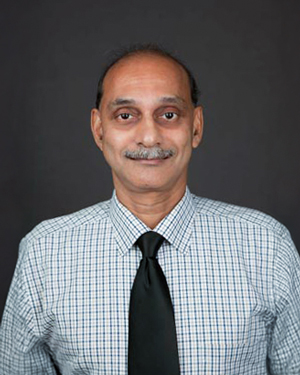
Professor - Biochemistry
Biochemistry
Dr. Kiran C. Patel College of Allopathic Medicine
Dr. K.V. "Venk" Venkatachalam received initial education B.S. (Botany) from St. John’s College and MS (Immunology), with first class and held highest rank from the MK University Campus, Madurai, India. After moving to the United States he received a B.S./M.S. degree in plant biology (1983, 1985) from Washington State University. He then took a researcher job for brief period in 1986 with Arthur Grossman, in the Carnegie Institute of Washington at Stanford University Campus, CA. He then moved to Texas in the fall of 1986 and was mentored by Professor Chauncey R. Benedict on Prenyltransferase enzymes and Polyisoprene synthesis. In 1991 he received his Ph.D. from the Department of Biochemistry, Texas A&M university, College Station, TX.Dr. Venk then went on to do his postdoctoral fellowship at Baylor College of Medicine, Houston, TX. He was working on enzymes of fatty acid biosynthesis acetyl CoA carboxylase and fatty acid synthase in mammals (with Salih Wakil, Department of Biochemistry and Molecular Biology) and on the mechanism of antibiotic resistance conferred by beta-lactamase (with Timothy Palzkill, Microbiology and Immunology).
After successful publication in journals such as J. Biol. Chem. he moved in 1993 to the National Institute of Child Health and Human Development (NICHD), National Institutes of Health (NIH), Bethesda, MD., as an Intramural Research Fellow. Under the chief guidance of Charles Strott M.D., Dr. Venk published pioneering work on the molecular cloning, expression and characterization of human phosphoadenosine phosphosulfate (PAPS) synthase-1 (PAPSS1). In 1997, he received the prestigious “Fellows Award for Research Excellence” at NIH research festival. He was also a teaching Faculty of Biochemistry, at NIH graduate school, as part of the Foundation of Advanced Educations in Sciences and taught students of NIH, Georgetown University etc.
With numerous scientific experiences and fine research talents and publications, he joined the Nova Southeastern University College of Medical Sciences as an associate professor. Since 1999, Dr. Venk has held extramural and intramural grants and conducted research and guided numerous medical students on research projects and published papers in high impact peer reviewed journals. He was also actively teaching Biochemistry for medical, dental, pharmacy and optometry students. In 2005, he became a full professor and continued to teach and perform research on human PAPSS synthase, lamprey petromyzonol sulfotransferase (PZ-SULT), human acetyl CoA carboxylase and relevant enzymes of sulfur metabolism.
In 2007 he moved on to research on Methionine gamma lyase (Mgld) of Methionine Metabolism. Since then he has expanded his Mgld/methionine projects into halitosis/periodontitis and cancer research. The gene therapeutic use of Mgld for cancer has been well received by the scientific community (patent pending). Members of Dr. Venk’s lab actively contributed to various national meetings on the role of methionine/SAM on cancer epigenetics. He is also a journal editor/reviewer for numerous peer reviewed journals. In 2015, he joined the College of Sciences of Florida Atlantic University (FAU), Boca Raton, FL, as an affiliate research professor.
Dr. Venk is training numerous Ph.D. and medical students on research related to the areas of halitosis, periodontitis, cancer and bone diseases. In 2017 he was awarded a joint appointment with NSU College of Allopathic Medicine and plans to expand his clinical research in the areas of cancer epigenetics, halitosis, and bone metabolism. Research Highlights Computational Modeling of Phosphokinase Activity of Human 3’- Phosphoadenosine 5’- Phosphosulfate Synthase (poster 1) Computational Modeling of Sulfurylase Activity of Human 3’-Phosphoadenosine 5’- Phosphosulfate Synthase (poster 2) Substrate Promiscuity of Methionine Gamma Lyase Deaminase from Porphyromonas gingivalis: Characterization by UV-VIS Spectroscopy Research Interests Cancer Cell Metabolism: Methionine Deprivation Induced Signaling Halitosis/Periodontitis: Role of Methionine Gamma Lyase Deaminase of Oral Pathogenic Organisms In Silico Molecular Docking/Drug Design (collaborative project) Wound Healing (Role of Cholesterol/Cholesterol-Sulfate) Natural Killer Cells Versus Cancer Cell Therapy (collaborative project)